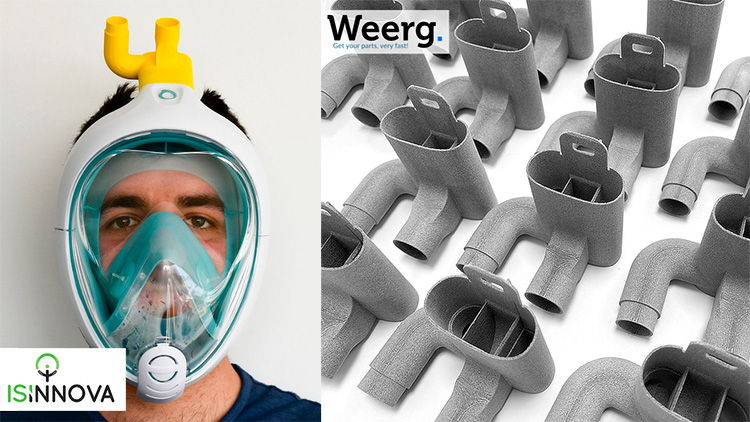"At this particular moment we feel that it is our duty to make a contribution, by putting our industrial production capacity at the service of initiatives capable of concretely helping health facilities in need", says Matteo Rigamonti, founder of Weerg.
He is telling how his revolutionary e-commerce has decided to collaborate with the project that bears the signature of Isinnova and FabLab Brescia, for the creation of emergency respiratory masks by modifying a Decathlon snorkeling mask.
"Thanks to the technologies we have, which ensure precision, repeatability and speed for print runs that reach thousands of pieces, we are able to produce parts of medical instruments that are needed in this moment of emergency in record time", continues Rigamonti. The 3D printers operating at Weerg can make a single piece as well as a series of up to 5,000 pieces out of thermoplastic materials such as Nylon PA11 and Nylon PA12, which are resistant and ideal for creating functional prototypes and final parts. A productivity that Weerg intends to put at the service of hospitals and companies that operate on the front line. “We have 50 quintals of PA12 Nylon for 3D printing solutions, that can help our country cope with this dramatic situation. This is why we are sending e-mails to healthcare companies to which we will reserve symbolic prices, sufficient to cover the costs of materials ".
Dr. Renato Favero, the former head of the Brescia hospital in Gardone Valtrompia, first brought up the idea of emergeny masks and thought of re-adapting a famous model of snorkel mask already on the market. The doctor turned to Isinnova, a consulting company in the industrial mechanical engineering sector, which in turn called Decathlon, manufacturer of the Easybreath snorkeling masks, who immediately collaborated by providing the CAD drawing. After careful evaluations for the necessary modifications, the add-on for the connection between mask and respirator was designed. Baptized "Charlotte" by Isinnova, the valve has already been patented for free use so that all hospitals can use it. With 3D printing, the first prototypes were made in record time and immediately tested on patients in a critical setting in hospitals in Brescia, where the crisis has hit especially hard. "These emergency masks are not certified for health facilities but can be used when there is a lack of official health supplies, such as the C-PAP masks used in sub-intensive care", specifies Isinnova on his own site. "Although this solution is currently an uncertified biomedical device, we are already getting confirmation from hospitals that it is proving extremely useful in the absence of anything else."
Isinnova and FabLab have chosen to share the file free of charge with all the companies able to print the valves and, together with many other companys that immediately took action, Weerg, an e-commerce specialized in 3D printing with a department for professional 3D printing, unique in Italy and the latest generation of industrial machines, immediately sprung into action. “We contacted Isinnova, whom we thank for the initiative, and in one day, thanks to our HP Multi Jet Fusion 5210 printers, we were able to supply them with a part of the 500 necessary valves made of PA12 Nylon, a material compatible with this health application ", explains Rigamonti. This first batch of valves, shipped to Isinnova, will be mounted on as many masks and supplied to the Brescia Civil Protection for distribution to hospitals.





